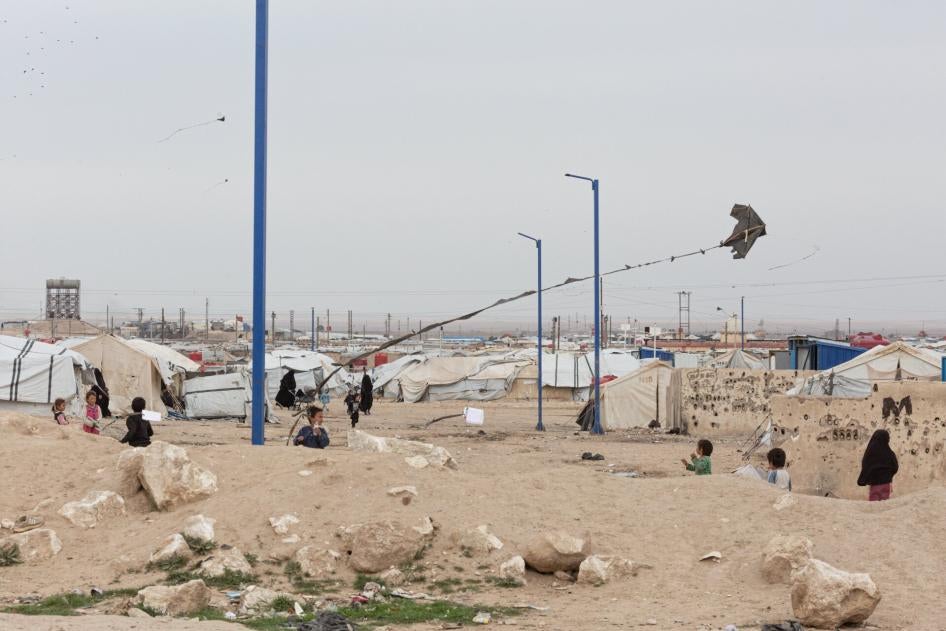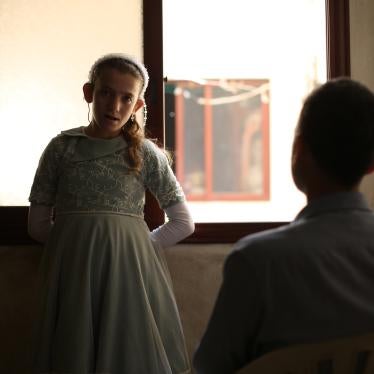The cry for help from a mother who was locked with her two young children inside a camp for Islamic State suspects and family members was desperate. All around her, she said, was disease, fear, and death.
“It never gets better here. Always worse,” she wrote Human Rights Watch in a furtive, clipped text message in March. “Majority of the children the camp are sick. Almost everyday something bad happens. Children trapped in burning tents and dies. … We have water tank that contains worms. … I want to go home.”
The mother, who asked to remain anonymous for fear of retaliation by camp guards or other detainees, is among about 45,000 foreign nationals held for more than two years in northeast Syria for alleged links to ISIS. More than half are young children, nearly 90 percent under age 12, and about half are six or younger, according to aid groups. Some may have been trafficked to Syria by ISIS.
The question of whether governments should repatriate these vulnerable people, or otherwise help bring them home, is under heated debate at the United Nations as it renews its Global Counter-Terrorism Strategy (GCTS). The General Assembly is scheduled to vote June 21 on a renewal resolution for the strategy, the U.N. blueprint for global responses to transnational threats like ISIS.
Nearly 31,000 of the foreigners in the camps are from neighboring Iraq. Nearly 12,000 others – 8,000 children and 4,000 women – are from about 60 other countries. At least 2,000 foreign males, including about 300 boys, are held in makeshift prisons. All are being held in conditions that are life-threatening, and so deeply degrading and often inhumane that they may amount to torture as our two organizations, Human Rights Watch and Rights and Security International, have documented. None have been brought before a judge to determine whether their confinement is legal and necessary, a flagrant violation of international law.
At least 28 countries have repatriated or otherwise helped bring home some or many of their detained nationals from northeast Syria since 2019, according to our research, showing that repatriations are feasible. But Western European countries, along with Australia and Canada, have brought home only a token few. While at times complex negotiations with the region’s Kurdish-led authorities may contribute to the delays, some countries are actively blocking their citizens’ returns, including by revoking their citizenship. The United Kingdom and the U.S.-led coalition against ISIS, meanwhile, are reportedly looking at building more prisons and locked “rehabilitation” centers in northeast Syria for the detainees.
Top U.N. officials including Secretary-General António Guterres, Human Rights Commissioner Michelle Bachelet, and Under-Secretary-General Vladimir Voronkov, the body’s counterterrorism chief, have repeatedly called on member States to expedite repatriating their nationals for rehabilitation, reintegration, and, as warranted, prosecution. Ending the indefinite, arbitrary detention of those held in horrific conditions in Syria is “one of the most pressing issues in the world today,” Voronkov said at an informal meeting of the U.N. Security Council in January. We wholeheartedly agree, as do more than 20 U.N. independent human rights experts, including Fionnuala Ní Aoláin, the special rapporteur on counterterrorism and executive editor at Just Security.
Repatriations language is included in the near-final draft of the updated counterterrorism strategy but it is extremely mild and met with strong opposition from many Western member States, based on markups of successive drafts. For example, one contested paragraph merely “takes note” of the key principles put forward by Guterres in 2019 “for the protection, repatriation, prosecution, rehabilitation and reintegration of women and children with links” to groups the U.N. proscribes as terrorist. It simply encourages U.N. entities to help member States repatriate these children on a “voluntary” and on a “case by case” basis in line with international law, including the rights of the child, should countries request help.
Opposition to such innocuous language suggests disregard for not only the secretary-general’s key principles but also portions of the binding Security Council resolution 2396 of 2017 highlighting that women and children linked to groups like ISIS are often victims. It also disregards Security Council resolution 2427 of 2018 and the Paris Principles, which hold that children associated with armed groups should be treated primarily as victims, even if they allegedly have committed crimes, with the best interests of the child and social reintegration as primary considerations.
In addition, eliminating this gentle reminder to align any repatriations of children with the rights of the child could serve the preference of some countries to bring home only orphans or children in urgent need of medical care, in most cases without their mothers and, in some cases, also without their siblings. A blanket policy of separating children from parents flouts the right to family unity, a pillar of the international Convention on the Rights of the Child, and the right to family life, enshrined in the European Convention on Human Rights. When the Trump administration did this at the U.S. border, it sparked international outcry.
As member States finalize the global counterterrorism strategy in the coming days, it is critical that they not delete or further weaken language in support of repatriation from the draft. Doing so would send the world a dangerous signal that when it comes to terrorism suspects and their family members, the General Assembly is willing to dispense with fundamental human rights protections that are a core feature of the U.N. Charter and of the Universal Declaration of Human Rights, which it adopted more than seven decades ago.
It would also signal that it is acceptable for countries to ignore their responsibility to protect their citizens who are facing serious violations abroad, such as loss of life and torture or cruel, inhuman or degrading treatment, when they have the practical power to do so. This could further fuel the narratives of armed groups seeking to polarize societies and undermine multilateralism.
The longer governments stall, the more they risk sharing responsibility for the collective punishment and possible torture of thousands of people, a majority of them young children. Should the General Assembly fail to include the “R” word in the U.N. counterterrorism strategy, it risks being viewed as acquiescent in these human rights abuses.








